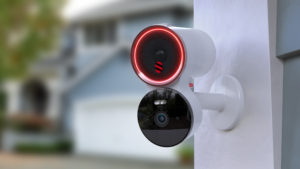The Differences Between Various CCTV Systems (Which To Choose, Pros & Cons)
The Differences Between Various CCTV Systems (Which To Choose, Pros & Cons)
Nowadays, indoor and outdoor security cameras are everywhere around us. They come in different shapes and styles. Perhaps the only major difference between them is the durability, design and features that they contain.
In order to understand the differences between various CCTV systems, you first need to understand what a CCTV system is.
What Is A CCTV System?
Nowadays, a close-circuit television is a TV system in which the signals are not publicly distributed but are monitored. Nowadays, CCTV systems are used primarily for surveillance and security purposes.
In a nutshell, a CCTV system relies on strategic placement of cameras and observation of the camera’s input. The cameras communicate with monitors and/or video recorders and the content is presented on the TV system only to those able to see it.
The Use Of CCTV Systems
CCTV systems let people oversee any activity within a designated area. There are options to zoom in or track something among the complex features. However, the general purpose of CCTV systems underlies this variety of purposes:
- Maintaining perimeter security in medium to high secure areas and installations
- Observing the behavior of incarcerated inmates and dangerous patients in medical facilities
- Traffic monitoring
- Overseeing potentially hazardous locations or toxic industrial environments
- Building and grounds security
- Obtaining a visual record of all the activities and situations where it is necessary to maintain proper security
The increasing use of CCTV in law enforcement ranges from traffic observation to monitoring crime areas and neighborhoods.
Indoor CCTV and Outdoor CCTV – Pros & Cons
In many occasions, people don’t think about installing a security camera system until after something has happened. However, it is important to determine whether you need an indoor CCTV or an outdoor CCTV so that you can protect your investment through a video system like this.
For the most part, both indoor CCTV and outdoor CCTV systems have the same feature sets. Design, shape and size are often identical and both indoor and outdoor cameras can be put in different enclosures. When it comes to specific features, most of the differences between indoor and outdoor CCTV cameras are linked to weather concerns.
However, today’s CCTV units and cameras are built to sustain any changing weather and have some degree of weather resistance. If you need an outdoor CCTV system in a region with extreme weather conditions (hot or cold), you should definitely ask for a special CCTV with high weather resistance and unique features.
The Types Of CCTV Systems (IP, TVI ANALOG, WiFi)
There are different analog cameras found in today’s CCTV security systems. As technology improves and becomes cheaper and more accessible, peace of mind and safety are one of the first necessities for the average home or business owner.
Once you understand the differences between standard IP, TVI cameras and wireless models, you will be able to choose the best option and fulfill your security needs. Below, we are listing the differences between each system.
IP Cameras
The standard IP camera connects to a Network Video Recorder or its network through an Ethernet cable. Once its hooked onto the cable, it can be accessed from anywhere in the world with an IP address and password for the camera.
IP cameras can have up to 4k resolution. The only disadvantage is the slight delay that occurs due to the Internet transfer of the footage to your monitor.
Analog Cameras
An analog camera connects to its network through a BNC cable. Since the connection is direct, the image transfer is instant as well. The camera does not process footage – it only captures it – so you will experience no delays when watching it in live view.
Even though analog is one of the older CCTV technologies out there, the cable connection can run up to 1500 feet. If you are looking to cover very large spaces or distances across multiple buildings, analog cameras may not be your best bet. In general, however, they are much less expensive than their IP counterparts – which is why they make a great budget-friendly option.
TVI Cameras
A TVI camera is an analog-based camera that is fused with high definition. In cases like these, the CCTV resolution can reach up to 1080 pixels. Just like the traditional analog counterparts, TVI cameras connect to networks using BNC cables, allowing the image transfer to be instant.
The cabling can run up to 900 feet, which makes TVI cameras most suitable for smaller places and rooms that are close to each other. So, the good thing is that they deliver a crisp and high-definition resolution at a cheaper price. The downside, however, are the cables associated with their installation.
Wireless Cameras
When it comes to wireless cameras, they are a great option because they eliminate the need for cables – which is in fact their unique selling point.
Another good thing is the fact that wireless CCTV systems can come in the form of:
- Wireless Analog Cameras – These connect to the network using an RF signal that replaces the traditional BNC cable. Even though this eliminates the trouble of wiring, wireless analog cameras are not very reliable as the connection is easily disrupted by interference from cell phones or other wireless devices.
- Wireless IP Cameras – Wireless systems are much more dependable than wireless analog cameras. They can connect to WiFi and password-based security features. All of this ensures that your connection stays private. The digital transmission is less easily affected by the surrounding devices than their analog counterparts. The image quality is based on the strength of the wireless connectivity – therefore if the WiFi signal is strong – this won’t be a problem.
So, What CCTV System To Choose?
If you ask our experts what makes a great CCTV system, everyone would agree that the image quality is the first and most important feature out there. Any CCTV unit with low quality is not recommended, especially nowadays, when clarity is not anymore a privilege – but a common need. As for he other features, you should determine and adapt to your needs. In the best-case scenario, you should consult with a professional and pick the best CCTV system for your needs.
To do that today, contact us and get a FREE estimate on the perfect type of CCTV for your business, organization and institution!
We are waiting for your call!





